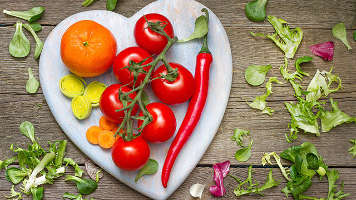Heart disease is at an all-time high, and a poor diet has been shown to be a contributing factor. A vegan diet plan can lower your risk of heart disease, as well as improve your overall health. Heart health is crucial to living a healthy long life. After all, it’s at the center of your circulatory system, and your heart is responsible for important functions, such as delivering oxygen-rich blood to vital areas of your body.
Being on a vegan diet plan is your first line of defense in lowering your risk of heart disease. Firstly, a vegan diet will steer you away from foods that are known to cause high cholesterol, high blood pressure, and other conditions that will put your heart at risk. Secondly, a vegan diet will add essential heart-protecting nutrients to your daily meals.
How Can it Lower the Risk of Heart Disease?
A Vegan Diet May Aid in Lowering Cholesterol
We all know that cholesterol can directly affect the heart, specifically LDL cholesterol, which contributes to clogged arteries. Various foods typically included in a vegan diet plan have been shown to aid in lowering cholesterol. For example, citrus fruits, as well as  apples, contain pectin, which studies have found prevents the absorption of cholesterol into the bloodstream. Additionally, removing saturated fats from your diet, and replacing them with polyunsaturated fats found in foods, such as avocados and nuts, will also aid in lowering your cholesterol. An informative 74-month study, where a strict vegetarian diet was implemented, showed lower cholesterol levels in its participants.
apples, contain pectin, which studies have found prevents the absorption of cholesterol into the bloodstream. Additionally, removing saturated fats from your diet, and replacing them with polyunsaturated fats found in foods, such as avocados and nuts, will also aid in lowering your cholesterol. An informative 74-month study, where a strict vegetarian diet was implemented, showed lower cholesterol levels in its participants.
A Vegan Diet Plan Can be Good for Blood Pressure
Have you noticed that, when you go to visit the doctor, they normally check your blood pressure? It seems to be part of their routine. They have a good reason for checking. High blood pressure will put a strain on your heart by making it work harder. Furthermore, high blood pressure can increase your risk of heart disease, and stroke. Sodium is a big culprit when it comes to high blood pressure rates. Plant-based foods can contain sodium, but most have levels that are naturally low. Do your research to make sure you are not choosing the plant-based foods that may contain more sodium than others. Additionally, many studies show that, eliminating animal-based food from your meals by being on a vegan diet plan, will reduce your risk of high blood pressure.
 What should you add to your vegan diet plan to reap the benefits of reducing your risk of high blood pressure? Try flax seeds! Results from various studies show that those who added flax seeds to their diet had a measurable decrease in blood pressure, as compared to those who took a placebo. Other foods that aid in lowering blood pressure include blueberries, brussels sprouts, and butternut squash.
What should you add to your vegan diet plan to reap the benefits of reducing your risk of high blood pressure? Try flax seeds! Results from various studies show that those who added flax seeds to their diet had a measurable decrease in blood pressure, as compared to those who took a placebo. Other foods that aid in lowering blood pressure include blueberries, brussels sprouts, and butternut squash.
A Plan You Can Feel Good About
Now you can feel even better about your vegan diet plan. We would, knowing it aids in lowering your risk of developing high blood pressure, as well as high cholesterol levels, which in turn, protects your heart.
Take Your Vegan Diet Plan to the Next Level!
We offer a 21-day program that will get you on the fast track to a healthier you. In this program, we challenge you to eat plant-based foods for 21 days. Check out our 21-day health boost program!
If you are considering taking a healthier approach to your food preparation, you have come to the right place. Check out our Living Raw Food Made Easy course.
If you want to take your raw food journey to a more advanced level, consider our Raw & Vegan Culinary Course.
The Raw Food Institute of Australia uses the term ‘vegan’ to refer to a whole, limited processed, plant-based food diet.

